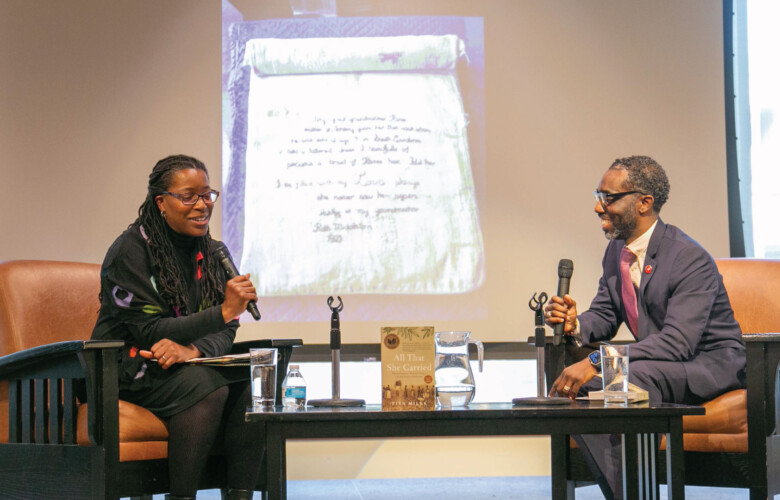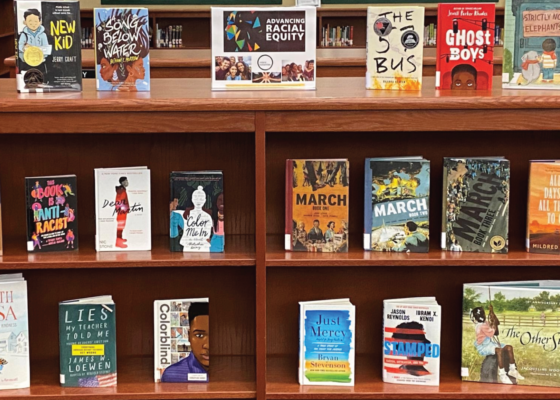5 things we learned with Dr. Tiya Miles
May 1, 2024Thanks to everyone who joined us for last week’s INconversation with Dr. Tiya Miles at the Eiteljorg Museum. We’re grateful to Dr. Miles and moderator Dr. Joseph Tucker Edmonds, associate…
Thanks to everyone who joined us for last week’s INconversation with Dr. Tiya Miles at the Eiteljorg Museum. We’re grateful to Dr. Miles and moderator Dr. Joseph Tucker Edmonds, associate professor of Africana studies and religious studies at Indiana University Indianapolis, for their thoughtful exchange about material culture, the resilience of Black women, telling responsible history with limited primary sources and the hard work of writing a book.
As we like to do at Indiana Humanities, we’ve recapped the conversation below with “5 Things We Learned.” Here are some moments that stood out to us:
1. Material culture as archive. Miles decided to tell a difficult history, one that a traditional archive would struggle to tell because of the lack of primary sources upon which to base the tale of “Rose, the visionary; Ashley, the survivor; and Ruth, the storyteller.” Miles acknowledged the ambition of All That She Carried: The Journey of Ashley’s Sack, a Black Family Keepsake being “a history about many things at once. Black women’s historical experiences across time and space, intergenerational memory, women’s working craft, place and environment, preparedness, resilience and adaptation, familial bonds, the fragility and ferocity of motherhood, embroidered and embodied memories, seed carrying, the triumph of love over loss and more.” She also saw it as the transformation of material culture — this singular thing — into a vessel for a family’s history, and the challenge to infuse her description of its journey “with the life of the people who used it, who packed it, who carried it and who turned it into a beautiful object of art.”
2. “It be filled with my love always.” Miles carefully considered each object Rose chose to place in the sack, as detailed in Ruth’s embroidered message:
My great grandmother Rose
mother of Ashley gave her this sack when
she was sold at age 9 in South Carolina
it held a tattered dress 3 handfulls of
pecans a braid of Roses hair. Told her
It be filled with my Love always
she never saw her again
Ashley is my grandmother
“A dress would’ve been a very important object for an enslaved girl in so many ways. It would’ve helped to protect her from the elements and it also could have aided in her disguise. … And a dress was also a very important part of an enslaved Black girl or woman’s ability to defend her dignity against people who would have negative intentions toward them in a context of extreme sexual predation that took place during slavery.” The braid was a powerful item as well. “It could function like a memento, a very strong memory device. It was actually a part of the mother that she was giving to her daughter. It was extremely tactile. Hair carries our DNA, so this was an actual physical connector between mother and daughter.” The pecans, which were not native to the area, could’ve provided nutrition or something valuable to trade. And finally, the mother included her love. “I think that love is the one thing that still remains as an intangible but tangible item that Rose put into the sack and she spoke into being by saying, ‘it be filled with my love always,’” Miles said.
3. Black women find a way. Miles spent a great deal of time considering the gift of pecans from mother to child, their value and their potential. She imagined the possibilities of Rose’s intentions and Ashley’s actions. Could Rose have intended a pecan tree — grown from the nuts — to provide shelter, sustenance and comfort? Could Ashley have planted the nuts to keep a connection with her mother alive? The story of deep loss and forced separation was common during American slavery, yet this particular experience illuminated how Black women were able to survive in the face of constant inhumanity. “They’re identifying the physical and emotional needs of their children and family members and generously providing those essential things to the best of their ability. Food, clothing, shelter, identity through lineage and, most centrally, an affirmation of worth and belonging,” Miles said. She also referred to one of her favorite books, Zora Neale Hurston’s Their Eyes Were Watching God, and Janie, the novel’s Black female protagonist, for whom life was also full of adversity. And she, too, endured.
4. Writing this book was difficult. Responding to a question from Tucker Edmonds about her writing, Miles admitted that this was a very difficult book to write. “This is a book that I rewrote more times than any other thing that I have written. And I think it’s important to share that, to expose the difficulty behind any kind of work and not to let anybody leave this room with the impression that it was easy. I think it’s hard for many of us, maybe for all of us who try to write something that is worthy of its subject.” Miles began to structure the book in one way and was well into writing it only to realize that the story felt cold because it centered the object, not the people. “So I decided to try to turn this around, to focus on the women and the little girl and the story, and weave my discussion of the objects through their movements and through their emotions.” That made things harder but ultimately proved to be the right decision. “I do want people to know that if you feel like writing doesn’t come easily to you, that’s no reason to stop. If you want to create something on the page or on the screen, it doesn’t have to come easy. It just has to come. You just have to be committed.”
5. What will you carry? All That She Carried opens with a quote from science-fiction writer Octavia Butler’s Parable of the Sower: “I think we should make emergency packs — grab and run packs — in case we need to get out of here in a hurry.” Lauren, the novel’s main character, senses that everything in her world is falling apart and is preparing for the inevitable. So, too, Rose knows what is coming and is ready. Miles recognized the parallels in the stories. When asked by Tucker Edmonds what would be in her emergency pack, Miles took a few moments before replying. Books would be in there, along with plants (she confessed to being an “informal and undisciplined gardener”). She also suggested the inclusion of something intangible: “I think that we should pack our relationships, because it is the people that we are living with and living around who are going to be with us as we face challenges, and we have to nourish those ties that we have with them.”
You can view photos from the INconversation here. You can also watch a recording of the event here for a limited time.



